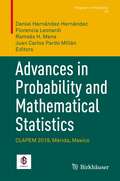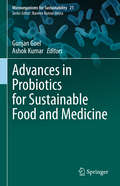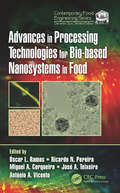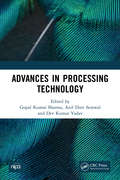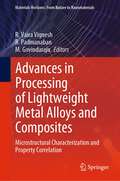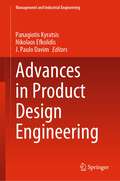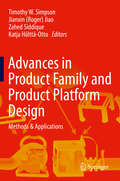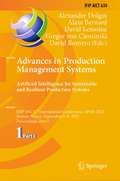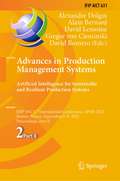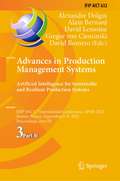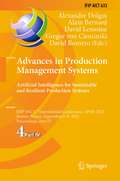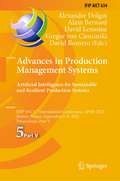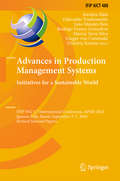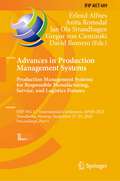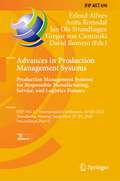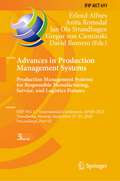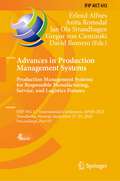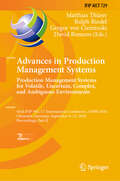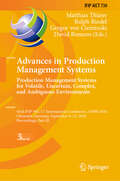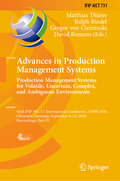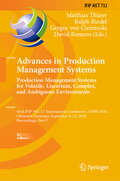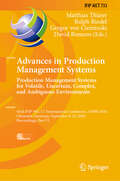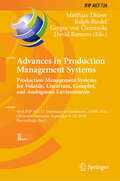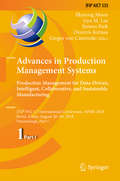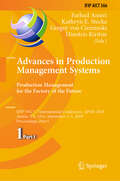- Table View
- List View
Advances in Probability and Mathematical Statistics: CLAPEM 2019, Mérida, Mexico (Progress in Probability #79)
by Daniel Hernández-Hernández Ramsés H. Mena Florencia Leonardi Juan Carlos Pardo MillánThis volume contains papers which were presented at the XV Latin American Congress of Probability and Mathematical Statistics (CLAPEM) in December 2019 in Mérida-Yucatán, México. They represent well the wide set of topics on probability and statistics that was covered at this congress, and their high quality and variety illustrates the rich academic program of the conference.
Advances in Probiotics for Sustainable Food and Medicine (Microorganisms for Sustainability #21)
by Ashok Kumar Gunjan GoelThis book focuses on probiotics as sustainable foods and medicines, discussing issues such as screening and identification of probiotics, health claims, and advances in processing technologies, as well as food safety. Based on sound scientific research, the book is a unique reference resource for food scientists interested in development of probiotic based functional foods and their marketing. It will also appeal to those working in the area of regulations regarding the use of and health claims for fermented foods, both locally and globally.
Advances in Processing Technologies for Bio-based Nanosystems in Food (Contemporary Food Engineering #1)
by António A. Vicente Óscar L. Ramos Ricardo N. Pereira Miguel A. Cerqueira José A. TeixeiraNanotechnology can be used to address challenges faced by the food and bioprocessing industries for developing and implementing improved or novel systems that can produce safer, nutritious, healthier, sustainable, and environmental-friendly food products. This book overviews the most recent advances made on the field of nanoscience and nanotechnology that significantly influenced the food industry. Advances in Processing Technologies for Bio-Based Nanosystems in Food provides a multidisciplinary review of the complex mechanisms involved in the research, development, production and legislation of food containing nanostructures systems. Features: Presents the most recent advances made in the field of nanoscience and nanotechnology as applied to the food industry Discusses innovative approaches and processing technologies Shows how nanotechnology can be used to produce safer, nutritious, healthier, sustainable and environmental-friendly food products Covers the complex mechanisms involved in the research, development, production and legislation of food containing nanostructures Selected examples of nanotechnology applications in food industry are shown, focusing on advanced aspects of food packaging, processing and preservation; followed by one contribution that presents the potential commercialization and the main challenges for scale-up. Comprised of 15 chapters, this book provides much-needed and up-to-date information on the use of emergent technologies in bio-based nanosystems for foods, and serves as an ideal reference for scientists, regulators, industrialists, and consumers that conduct research and development in the food processing industry.
Advances in Processing Technology
by Gopal Kumar Sharma Fafst IThe present book is an amalgamation of various topics which are quite relevant to academics pertaining to food science and technology. Sincere attempts have been made to map consumer's perception in terms of sensory evaluation of processed foods and their role on quality determination. To cover food safety, the topic of advancement in the traceability and transparency of food supply chain is discussed in length. Besides, providing basic nutrition food has become an essential source of health promoting phyto-ingredients too. To take care of the concerned population, therapeutic foods have also been discussed with their future trends. Similarly, recent trends in functional and Nutraceutical foods were also discussed in detail so as to give an exhaustive overlook of such subject matter. To give impetus to the growing and aged generations, the importance of the technology of weaning and geriatric foods is described in detail. Bio-preservation of various food products including fermentation had always attracted researchers for various reasons, inclusive of its novel and chemical free approach of preservation which has been aptly covered under current expansions in microbiology for food preservation and also under progression in biotechnology and its application in food processing. The cross linkage of advance technologies inclusive of nano-science is elaborated as technological advances in nano- science for specific food and nutrition delivery. Oil and spice commerce are two giants pillars in food processing industries and readers would surely be wishing to understand the developments in the technology of oils refineries and condiments. Smart and intelligent packing systems always extend an upper hand as far as shelf life monitoring of any processed food is concerned, especially when these are import worthy products. The science and technological approach of these packing innovations is also well covered.Note: T&F does not sell or distribute the hardback in India, Pakistan, Nepal, Bhutan, Bangladesh and Sri Lanka. This title is co-published with NIPA.
Advances in Processing of Lightweight Metal Alloys and Composites: Microstructural Characterization and Property Correlation (Materials Horizons: From Nature to Nanomaterials)
by R. Vaira Vignesh R. Padmanaban M. GovindarajuThis book covers the most important aspects of lightweight metal alloys including history, physical metallurgy, overview of production technologies, alloy development, compositing, post-processing (heat treatment, surface engineering, bulk-deformation), and joining methodologies. It discusses the microstructural evolution, fractography, morphology of corroded and worn surface to enable easy understanding of the mechanism. The topics covered in this book include lightweight metallic materials, instrumental characterization of light weight metal alloys and composites, severe plastic deformation processing of aluminum alloys, solid-state welding of aluminum alloys, aluminum metal matrix composite for automotive and aircraft applications, and heat treatment of aluminum metal matrix composites. The book is highly useful for students, researchers, academicians, scientists, and engineers working on lightweight materials.
Advances in Product Design Engineering (Management and Industrial Engineering)
by J. Paulo Davim Panagiotis Kyratsis Nikolaos EfkolidisThis book focus on the product design process. It follows a holistic approach covering conceptual design, design methodologies, sustainability, manufacturing, product analysis, materials, design and manufacturing technologies. The reader can find interesting cases about industrial design, 3D printing and 4D printing for wearables. The axiomatic design methodology is presented together with applications in machine learning and knowledge-based systems. Research about personalized fashion and professional uniform evaluations methods are included. Finally, the digital transformation, aesthetic design and the use of materials in orthopedic design is present.
Advances in Product Family and Product Platform Design: Methods & Applications
by Timothy W. Simpson Jianxin Roger Jiao Zahed Siddique Katja Hölttä-OttoAdvances in Product Family and Product Platform Design: Methods & Applications highlights recent advances that have been made to support product family and product platform design along with successful applications in industry. This book provides not only motivation for product family and product platform design (i. e. , address questions about "why and when should we platform") but also methods and tools to support the design and development of families of products based on shared platforms (i. e. address the "how" and "what" questions about platforming). It begins with a general overview of product family design to introduce the general reader to the topic and then progress to more advanced topics and design theory to help designers, engineers, and project managers plan, architect, and implement platform-based product development strategies for their company. Finally, successful industry applications provide readers and practitioners with case studies and "talking points" to become platform advocates and leaders within their organization.
Advances in Production Management Systems. Artificial Intelligence for Sustainable and Resilient Production Systems: IFIP WG 5.7 International Conference, APMS 2021, Nantes, France, September 5–9, 2021, Proceedings, Part I (IFIP Advances in Information and Communication Technology #630)
by Alain Bernard Gregor Von Cieminski David Romero Alexandre Dolgui David LemoineThe five-volume set IFIP AICT 630, 631, 632, 633, and 634 constitutes the refereed proceedings of the International IFIP WG 5.7 Conference on Advances in Production Management Systems, APMS 2021, held in Nantes, France, in September 2021.*The 378 papers presented were carefully reviewed and selected from 529 submissions. They discuss artificial intelligence techniques, decision aid and new and renewed paradigms for sustainable and resilient production systems at four-wall factory and value chain levels. The papers are organized in the following topical sections: Part I: artificial intelligence based optimization techniques for demand-driven manufacturing; hybrid approaches for production planning and scheduling; intelligent systems for manufacturing planning and control in the industry 4.0; learning and robust decision support systems for agile manufacturing environments; low-code and model-driven engineering for production system; meta-heuristics and optimization techniques for energy-oriented manufacturing systems; metaheuristics for production systems; modern analytics and new AI-based smart techniques for replenishment and production planning under uncertainty; system identification for manufacturing control applications; and the future of lean thinking and practice Part II: digital transformation of SME manufacturers: the crucial role of standard; digital transformations towards supply chain resiliency; engineering of smart-product-service-systems of the future; lean and Six Sigma in services healthcare; new trends and challenges in reconfigurable, flexible or agile production system; production management in food supply chains; and sustainability in production planning and lot-sizing Part III: autonomous robots in delivery logistics; digital transformation approaches in production management; finance-driven supply chain; gastronomic service system design; modern scheduling and applications in industry 4.0; recent advances in sustainable manufacturing; regular session: green production and circularity concepts; regular session: improvement models and methods for green and innovative systems; regular session: supply chain and routing management; regular session: robotics and human aspects; regular session: classification and data management methods; smart supply chain and production in society 5.0 era; and supply chain risk management under coronavirus Part IV: AI for resilience in global supply chain networks in the context of pandemic disruptions; blockchain in the operations and supply chain management; data-based services as key enablers for smart products, manufacturing and assembly; data-driven methods for supply chain optimization; digital twins based on systems engineering and semantic modeling; digital twins in companies first developments and future challenges; human-centered artificial intelligence in smart manufacturing for the operator 4.0; operations management in engineer-to-order manufacturing; product and asset life cycle management for smart and sustainable manufacturing systems; robotics technologies for control, smart manufacturing and logistics; serious games analytics: improving games and learning support; smart and sustainable production and supply chains; smart methods and techniques for sustainable supply chain management; the new digital lean manufacturing paradigm; and the role of emerging technologies in disaster relief operations: lessons from COVID-19 Part V: data-driven platforms and applications in production and logistics: digital twins and AI for sustainability; regular session: new approaches for routing problem solving; regular session: improvement of design and operation of manufacturing systems; regular session: crossdock and transportation issues; regular session: maintenance improvement and lifecycle management; regular session: additive manufacturing and mass customization; regular session: frameworks and conceptual modelling for systems and services efficiency; regular session: optimization of production and transportation
Advances in Production Management Systems. Artificial Intelligence for Sustainable and Resilient Production Systems: IFIP WG 5.7 International Conference, APMS 2021, Nantes, France, September 5–9, 2021, Proceedings, Part II (IFIP Advances in Information and Communication Technology #631)
by Alain Bernard Gregor Von Cieminski David Romero Alexandre Dolgui David LemoineThe five-volume set IFIP AICT 630, 631, 632, 633, and 634 constitutes the refereed proceedings of the International IFIP WG 5.7 Conference on Advances in Production Management Systems, APMS 2021, held in Nantes, France, in September 2021.*The 378 papers presented were carefully reviewed and selected from 529 submissions. They discuss artificial intelligence techniques, decision aid and new and renewed paradigms for sustainable and resilient production systems at four-wall factory and value chain levels. The papers are organized in the following topical sections: Part I: artificial intelligence based optimization techniques for demand-driven manufacturing; hybrid approaches for production planning and scheduling; intelligent systems for manufacturing planning and control in the industry 4.0; learning and robust decision support systems for agile manufacturing environments; low-code and model-driven engineering for production system; meta-heuristics and optimization techniques for energy-oriented manufacturing systems; metaheuristics for production systems; modern analytics and new AI-based smart techniques for replenishment and production planning under uncertainty; system identification for manufacturing control applications; and the future of lean thinking and practice Part II: digital transformation of SME manufacturers: the crucial role of standard; digital transformations towards supply chain resiliency; engineering of smart-product-service-systems of the future; lean and Six Sigma in services healthcare; new trends and challenges in reconfigurable, flexible or agile production system; production management in food supply chains; and sustainability in production planning and lot-sizing Part III: autonomous robots in delivery logistics; digital transformation approaches in production management; finance-driven supply chain; gastronomic service system design; modern scheduling and applications in industry 4.0; recent advances in sustainable manufacturing; regular session: green production and circularity concepts; regular session: improvement models and methods for green and innovative systems; regular session: supply chain and routing management; regular session: robotics and human aspects; regular session: classification and data management methods; smart supply chain and production in society 5.0 era; and supply chain risk management under coronavirus Part IV: AI for resilience in global supply chain networks in the context of pandemic disruptions; blockchain in the operations and supply chain management; data-based services as key enablers for smart products, manufacturing and assembly; data-driven methods for supply chain optimization; digital twins based on systems engineering and semantic modeling; digital twins in companies first developments and future challenges; human-centered artificial intelligence in smart manufacturing for the operator 4.0; operations management in engineer-to-order manufacturing; product and asset life cycle management for smart and sustainable manufacturing systems; robotics technologies for control, smart manufacturing and logistics; serious games analytics: improving games and learning support; smart and sustainable production and supply chains; smart methods and techniques for sustainable supply chain management; the new digital lean manufacturing paradigm; and the role of emerging technologies in disaster relief operations: lessons from COVID-19 Part V: data-driven platforms and applications in production and logistics: digital twins and AI for sustainability; regular session: new approaches for routing problem solving; regular session: improvement of design and operation of manufacturing systems; regular session: crossdock and transportation issues; regular session: maintenance improvement and lifecycle management; regular session: additive manufacturing and mass customization; regular session: frameworks and conceptual modelling for systems and services efficiency; regular session: optimization of production and transportation
Advances in Production Management Systems. Artificial Intelligence for Sustainable and Resilient Production Systems: IFIP WG 5.7 International Conference, APMS 2021, Nantes, France, September 5–9, 2021, Proceedings, Part III (IFIP Advances in Information and Communication Technology #632)
by Alain Bernard Gregor Von Cieminski David Romero Alexandre Dolgui David LemoineThe five-volume set IFIP AICT 630, 631, 632, 633, and 634 constitutes the refereed proceedings of the International IFIP WG 5.7 Conference on Advances in Production Management Systems, APMS 2021, held in Nantes, France, in September 2021.*The 378 papers presented were carefully reviewed and selected from 529 submissions. They discuss artificial intelligence techniques, decision aid and new and renewed paradigms for sustainable and resilient production systems at four-wall factory and value chain levels. The papers are organized in the following topical sections: Part I: artificial intelligence based optimization techniques for demand-driven manufacturing; hybrid approaches for production planning and scheduling; intelligent systems for manufacturing planning and control in the industry 4.0; learning and robust decision support systems for agile manufacturing environments; low-code and model-driven engineering for production system; meta-heuristics and optimization techniques for energy-oriented manufacturing systems; metaheuristics for production systems; modern analytics and new AI-based smart techniques for replenishment and production planning under uncertainty; system identification for manufacturing control applications; and the future of lean thinking and practice Part II: digital transformation of SME manufacturers: the crucial role of standard; digital transformations towards supply chain resiliency; engineering of smart-product-service-systems of the future; lean and Six Sigma in services healthcare; new trends and challenges in reconfigurable, flexible or agile production system; production management in food supply chains; and sustainability in production planning and lot-sizing Part III: autonomous robots in delivery logistics; digital transformation approaches in production management; finance-driven supply chain; gastronomic service system design; modern scheduling and applications in industry 4.0; recent advances in sustainable manufacturing; regular session: green production and circularity concepts; regular session: improvement models and methods for green and innovative systems; regular session: supply chain and routing management; regular session: robotics and human aspects; regular session: classification and data management methods; smart supply chain and production in society 5.0 era; and supply chain risk management under coronavirus Part IV: AI for resilience in global supply chain networks in the context of pandemic disruptions; blockchain in the operations and supply chain management; data-based services as key enablers for smart products, manufacturing and assembly; data-driven methods for supply chain optimization; digital twins based on systems engineering and semantic modeling; digital twins in companies first developments and future challenges; human-centered artificial intelligence in smart manufacturing for the operator 4.0; operations management in engineer-to-order manufacturing; product and asset life cycle management for smart and sustainable manufacturing systems; robotics technologies for control, smart manufacturing and logistics; serious games analytics: improving games and learning support; smart and sustainable production and supply chains; smart methods and techniques for sustainable supply chain management; the new digital lean manufacturing paradigm; and the role of emerging technologies in disaster relief operations: lessons from COVID-19 Part V: data-driven platforms and applications in production and logistics: digital twins and AI for sustainability; regular session: new approaches for routing problem solving; regular session: improvement of design and operation of manufacturing systems; regular session: crossdock and transportation issues; regular session: maintenance improvement and lifecycle management; regular session: additive manufacturing and mass customization; regular session: frameworks and conceptual modelling for systems and services efficiency; regular session: optimization of production and transportation
Advances in Production Management Systems. Artificial Intelligence for Sustainable and Resilient Production Systems: IFIP WG 5.7 International Conference, APMS 2021, Nantes, France, September 5–9, 2021, Proceedings, Part IV (IFIP Advances in Information and Communication Technology #633)
by Alain Bernard Gregor Von Cieminski David Romero Alexandre Dolgui David LemoineThe five-volume set IFIP AICT 630, 631, 632, 633, and 634 constitutes the refereed proceedings of the International IFIP WG 5.7 Conference on Advances in Production Management Systems, APMS 2021, held in Nantes, France, in September 2021.*The 378 papers presented were carefully reviewed and selected from 529 submissions. They discuss artificial intelligence techniques, decision aid and new and renewed paradigms for sustainable and resilient production systems at four-wall factory and value chain levels. The papers are organized in the following topical sections: Part I: artificial intelligence based optimization techniques for demand-driven manufacturing; hybrid approaches for production planning and scheduling; intelligent systems for manufacturing planning and control in the industry 4.0; learning and robust decision support systems for agile manufacturing environments; low-code and model-driven engineering for production system; meta-heuristics and optimization techniques for energy-oriented manufacturing systems; metaheuristics for production systems; modern analytics and new AI-based smart techniques for replenishment and production planning under uncertainty; system identification for manufacturing control applications; and the future of lean thinking and practice Part II: digital transformation of SME manufacturers: the crucial role of standard; digital transformations towards supply chain resiliency; engineering of smart-product-service-systems of the future; lean and Six Sigma in services healthcare; new trends and challenges in reconfigurable, flexible or agile production system; production management in food supply chains; and sustainability in production planning and lot-sizing Part III: autonomous robots in delivery logistics; digital transformation approaches in production management; finance-driven supply chain; gastronomic service system design; modern scheduling and applications in industry 4.0; recent advances in sustainable manufacturing; regular session: green production and circularity concepts; regular session: improvement models and methods for green and innovative systems; regular session: supply chain and routing management; regular session: robotics and human aspects; regular session: classification and data management methods; smart supply chain and production in society 5.0 era; and supply chain risk management under coronavirus Part IV: AI for resilience in global supply chain networks in the context of pandemic disruptions; blockchain in the operations and supply chain management; data-based services as key enablers for smart products, manufacturing and assembly; data-driven methods for supply chain optimization; digital twins based on systems engineering and semantic modeling; digital twins in companies first developments and future challenges; human-centered artificial intelligence in smart manufacturing for the operator 4.0; operations management in engineer-to-order manufacturing; product and asset life cycle management for smart and sustainable manufacturing systems; robotics technologies for control, smart manufacturing and logistics; serious games analytics: improving games and learning support; smart and sustainable production and supply chains; smart methods and techniques for sustainable supply chain management; the new digital lean manufacturing paradigm; and the role of emerging technologies in disaster relief operations: lessons from COVID-19 Part V: data-driven platforms and applications in production and logistics: digital twins and AI for sustainability; regular session: new approaches for routing problem solving; regular session: improvement of design and operation of manufacturing systems; regular session: crossdock and transportation issues; regular session: maintenance improvement and lifecycle management; regular session: additive manufacturing and mass customization; regular session: frameworks and conceptual modelling for systems and services efficiency; regular session: optimization of production and transportation
Advances in Production Management Systems. Artificial Intelligence for Sustainable and Resilient Production Systems: IFIP WG 5.7 International Conference, APMS 2021, Nantes, France, September 5–9, 2021, Proceedings, Part V (IFIP Advances in Information and Communication Technology #634)
by Alain Bernard Gregor Von Cieminski David Romero Alexandre Dolgui David LemoineThe five-volume set IFIP AICT 630, 631, 632, 633, and 634 constitutes the refereed proceedings of the International IFIP WG 5.7 Conference on Advances in Production Management Systems, APMS 2021, held in Nantes, France, in September 2021.*The 378 papers presented were carefully reviewed and selected from 529 submissions. They discuss artificial intelligence techniques, decision aid and new and renewed paradigms for sustainable and resilient production systems at four-wall factory and value chain levels. The papers are organized in the following topical sections: Part I: artificial intelligence based optimization techniques for demand-driven manufacturing; hybrid approaches for production planning and scheduling; intelligent systems for manufacturing planning and control in the industry 4.0; learning and robust decision support systems for agile manufacturing environments; low-code and model-driven engineering for production system; meta-heuristics and optimization techniques for energy-oriented manufacturing systems; metaheuristics for production systems; modern analytics and new AI-based smart techniques for replenishment and production planning under uncertainty; system identification for manufacturing control applications; and the future of lean thinking and practice Part II: digital transformation of SME manufacturers: the crucial role of standard; digital transformations towards supply chain resiliency; engineering of smart-product-service-systems of the future; lean and Six Sigma in services healthcare; new trends and challenges in reconfigurable, flexible or agile production system; production management in food supply chains; and sustainability in production planning and lot-sizing Part III: autonomous robots in delivery logistics; digital transformation approaches in production management; finance-driven supply chain; gastronomic service system design; modern scheduling and applications in industry 4.0; recent advances in sustainable manufacturing; regular session: green production and circularity concepts; regular session: improvement models and methods for green and innovative systems; regular session: supply chain and routing management; regular session: robotics and human aspects; regular session: classification and data management methods; smart supply chain and production in society 5.0 era; and supply chain risk management under coronavirus Part IV: AI for resilience in global supply chain networks in the context of pandemic disruptions; blockchain in the operations and supply chain management; data-based services as key enablers for smart products, manufacturing and assembly; data-driven methods for supply chain optimization; digital twins based on systems engineering and semantic modeling; digital twins in companies first developments and future challenges; human-centered artificial intelligence in smart manufacturing for the operator 4.0; operations management in engineer-to-order manufacturing; product and asset life cycle management for smart and sustainable manufacturing systems; robotics technologies for control, smart manufacturing and logistics; serious games analytics: improving games and learning support; smart and sustainable production and supply chains; smart methods and techniques for sustainable supply chain management; the new digital lean manufacturing paradigm; and the role of emerging technologies in disaster relief operations: lessons from COVID-19 Part V: data-driven platforms and applications in production and logistics: digital twins and AI for sustainability; regular session: new approaches for routing problem solving; regular session: improvement of design and operation of manufacturing systems; regular session: crossdock and transportation issues; regular session: maintenance improvement and lifecycle management; regular session: additive manufacturing and mass customization; regular session: frameworks and conceptual modelling for systems and services efficiency; regular session: optimization of production and transportation
Advances in Production Management Systems. Initiatives for a Sustainable World: IFIP WG 5.7 International Conference, APMS 2016, Iguassu Falls, Brazil, September 3-7, 2016, Revised Selected Papers (IFIP Advances in Information and Communication Technology #488)
by Dimitris Kiritsis Gregor Von Cieminski Irenilza Nääs Oduvaldo Vendrametto João Mendes Reis Rodrigo Franco Gonçalves Márcia Terra SilvaThis book constitutes the refereed post-conference proceedings of the International IFIP WG 5. 7 Conference on Advances in Production Management Systems, APMS 2016, held in Iguassu Falls, Brazil, in September 2016. The 117 revised full papers were carefully reviewed and selected from 164 submissions. They are organized in the following topical sections: computational intelligence in production management; intelligent manufacturing systems; knowledge-based PLM; modelling of business and operational processes; virtual, digital and smart factory; flexible, sustainable supply chains; large-scale supply chains; sustainable manufacturing; quality in production management; collaborative systems; innovation and collaborative networks; agrifood supply chains; production economics; lean manufacturing; cyber-physical technology deployments in smart manufacturing systems; smart manufacturing system characterization; knowledge management in production systems; service-oriented architecture for smart manufacturing systems; advances in cleaner production; sustainable production management; and operations management in engineer-to-order manufacturing.
Advances in Production Management Systems. Production Management Systems for Responsible Manufacturing, Service, and Logistics Futures: IFIP WG 5.7 International Conference, APMS 2023, Trondheim, Norway, September 17–21, 2023, Proceedings, Part I (IFIP Advances in Information and Communication Technology #689)
by Gregor Von Cieminski Jan Ola Strandhagen David Romero Erlend Alfnes Anita RomsdalThis 4-volume set, IFIP AICT 689-692, constitutes the refereed proceedings of the International IFIP WG 5.7 Conference on Advances in Production Management Systems, APMS 2023, held in Trondheim, Norway, during September 17–21, 2023. The 213 full papers presented in these volumes were carefully reviewed and selected from a total of 224 submissions. They were organized in topical sections as follows: Part I : Lean Management in the Industry 4.0 Era; Crossroads and Paradoxes in the Digital Lean Manufacturing World; Digital Transformation Approaches in Production Management; Managing Digitalization of Production Systems; Workforce Evolutionary Pathways in Smart Manufacturing Systems; Next Generation Human-Centered Manufacturing and Logistics Systems for the Operator 5.0; and SME 5.0: Exploring Pathways to the Next Level of Intelligent, Sustainable, and Human-Centered SMEs. Part II : Digitally Enabled and Sustainable Service and Operations Management in PSS Lifecycle; Exploring Digital Servitization in Manufacturing; Everything-as-a-Service (XaaS) Business Models in the Manufacturing Industry; Digital Twin Concepts in Production and Services; Experiential Learning in Engineering Education; Lean in Healthcare; Additive Manufacturing in Operations and Supply Chain Management; and Applications of Artificial Intelligence in Manufacturing. Part III : Towards Next-Generation Production and SCM in Yard and Construction Industries; Transforming Engineer-to-Order Projects, Supply Chains and Ecosystems; Modelling Supply Chain and Production Systems; Advances in Dynamic Scheduling Technologies for Smart Manufacturing; and Smart Production Planning and Control. Part IV : Circular Manufacturing and Industrial Eco-Efficiency; Smart Manufacturing to Support Circular Economy; Product Information Management and Extended Producer Responsibility; Product and Asset Life Cycle Management for Sustainable and Resilient Manufacturing Systems; Sustainable Mass Customization in the Era of Industry 5.0; Food and Bio-Manufacturing; Battery Production Development and Management; Operations and SCM in Energy-Intensive Production for a Sustainable Future; and Resilience Management in Supply Chains.
Advances in Production Management Systems. Production Management Systems for Responsible Manufacturing, Service, and Logistics Futures: IFIP WG 5.7 International Conference, APMS 2023, Trondheim, Norway, September 17–21, 2023, Proceedings, Part II (IFIP Advances in Information and Communication Technology #690)
by Gregor Von Cieminski Jan Ola Strandhagen David Romero Erlend Alfnes Anita RomsdalThis 4-volume set, IFIP AICT 689-692, constitutes the refereed proceedings of the International IFIP WG 5.7 Conference on Advances in Production Management Systems, APMS 2023, held in Trondheim, Norway, during September 17–21, 2023. The 213 full papers presented in these volumes were carefully reviewed and selected from a total of 224 submissions. They were organized in topical sections as follows: Part I : Lean Management in the Industry 4.0 Era; Crossroads and Paradoxes in the Digital Lean Manufacturing World; Digital Transformation Approaches in Production Management; Managing Digitalization of Production Systems; Workforce Evolutionary Pathways in Smart Manufacturing Systems; Next Generation Human-Centered Manufacturing and Logistics Systems for the Operator 5.0; and SME 5.0: Exploring Pathways to the Next Level of Intelligent, Sustainable, and Human-Centered SMEs. Part II : Digitally Enabled and Sustainable Service and Operations Management in PSS Lifecycle; Exploring Digital Servitization in Manufacturing; Everything-as-a-Service (XaaS) Business Models in the Manufacturing Industry; Digital Twin Concepts in Production and Services; Experiential Learning in Engineering Education; Lean in Healthcare; Additive Manufacturing in Operations and Supply Chain Management; and Applications of Artificial Intelligence in Manufacturing. Part III : Towards Next-Generation Production and SCM in Yard and Construction Industries; Transforming Engineer-to-Order Projects, Supply Chains and Ecosystems; Modelling Supply Chain and Production Systems; Advances in Dynamic Scheduling Technologies for Smart Manufacturing; and Smart Production Planning and Control. Part IV : Circular Manufacturing and Industrial Eco-Efficiency; Smart Manufacturing to Support Circular Economy; Product Information Management and Extended Producer Responsibility; Product and Asset Life Cycle Management for Sustainable and Resilient Manufacturing Systems; Sustainable Mass Customization in the Era of Industry 5.0; Food and Bio-Manufacturing; Battery Production Development and Management; Operations and SCM in Energy-Intensive Production for a Sustainable Future; and Resilience Management in Supply Chains.
Advances in Production Management Systems. Production Management Systems for Responsible Manufacturing, Service, and Logistics Futures: IFIP WG 5.7 International Conference, APMS 2023, Trondheim, Norway, September 17–21, 2023, Proceedings, Part III (IFIP Advances in Information and Communication Technology #691)
by Gregor Von Cieminski Jan Ola Strandhagen David Romero Erlend Alfnes Anita RomsdalThis 4-volume set, IFIP AICT 689-692, constitutes the refereed proceedings of the International IFIP WG 5.7 Conference on Advances in Production Management Systems, APMS 2023, held in Trondheim, Norway, during September 17–21, 2023. The 213 full papers presented in these volumes were carefully reviewed and selected from a total of 224 submissions. They were organized in topical sections as follows: Part I : Lean Management in the Industry 4.0 Era; Crossroads and Paradoxes in the Digital Lean Manufacturing World; Digital Transformation Approaches in Production Management; Managing Digitalization of Production Systems; Workforce Evolutionary Pathways in Smart Manufacturing Systems; Next Generation Human-Centered Manufacturing and Logistics Systems for the Operator 5.0; and SME 5.0: Exploring Pathways to the Next Level of Intelligent, Sustainable, and Human-Centered SMEs. Part II : Digitally Enabled and Sustainable Service and Operations Management in PSS Lifecycle; Exploring Digital Servitization in Manufacturing; Everything-as-a-Service (XaaS) Business Models in the Manufacturing Industry; Digital Twin Concepts in Production and Services; Experiential Learning in Engineering Education; Lean in Healthcare; Additive Manufacturing in Operations and Supply Chain Management; and Applications of Artificial Intelligence in Manufacturing. Part III : Towards Next-Generation Production and SCM in Yard and Construction Industries; Transforming Engineer-to-Order Projects, Supply Chains and Ecosystems; Modelling Supply Chain and Production Systems; Advances in Dynamic Scheduling Technologies for Smart Manufacturing; and Smart Production Planning and Control. Part IV : Circular Manufacturing and Industrial Eco-Efficiency; Smart Manufacturing to Support Circular Economy; Product Information Management and Extended Producer Responsibility; Product and Asset Life Cycle Management for Sustainable and Resilient Manufacturing Systems; Sustainable Mass Customization in the Era of Industry 5.0; Food and Bio-Manufacturing; Battery Production Development and Management; Operations and SCM in Energy-Intensive Production for a Sustainable Future; and Resilience Management in Supply Chains.
Advances in Production Management Systems. Production Management Systems for Responsible Manufacturing, Service, and Logistics Futures: IFIP WG 5.7 International Conference, APMS 2023, Trondheim, Norway, September 17–21, 2023, Proceedings, Part IV (IFIP Advances in Information and Communication Technology #692)
by Gregor Von Cieminski Jan Ola Strandhagen David Romero Erlend Alfnes Anita RomsdalThis 4-volume set, IFIP AICT 689-692, constitutes the refereed proceedings of the International IFIP WG 5.7 Conference on Advances in Production Management Systems, APMS 2023, held in Trondheim, Norway, during September 17–21, 2023. The 213 full papers presented in these volumes were carefully reviewed and selected from a total of 224 submissions. They were organized in topical sections as follows: Part I : Lean Management in the Industry 4.0 Era; Crossroads and Paradoxes in the Digital Lean Manufacturing World; Digital Transformation Approaches in Production Management; Managing Digitalization of Production Systems; Workforce Evolutionary Pathways in Smart Manufacturing Systems; Next Generation Human-Centered Manufacturing and Logistics Systems for the Operator 5.0; and SME 5.0: Exploring Pathways to the Next Level of Intelligent, Sustainable, and Human-Centered SMEs. Part II : Digitally Enabled and Sustainable Service and Operations Management in PSS Lifecycle; Exploring Digital Servitization in Manufacturing; Everything-as-a-Service (XaaS) Business Models in the Manufacturing Industry; Digital Twin Concepts in Production and Services; Experiential Learning in Engineering Education; Lean in Healthcare; Additive Manufacturing in Operations and Supply Chain Management; and Applications of Artificial Intelligence in Manufacturing. Part III : Towards Next-Generation Production and SCM in Yard and Construction Industries; Transforming Engineer-to-Order Projects, Supply Chains and Ecosystems; Modelling Supply Chain and Production Systems; Advances in Dynamic Scheduling Technologies for Smart Manufacturing; and Smart Production Planning and Control. Part IV : Circular Manufacturing and Industrial Eco-Efficiency; Smart Manufacturing to Support Circular Economy; Product Information Management and Extended Producer Responsibility; Product and Asset Life Cycle Management for Sustainable and Resilient Manufacturing Systems; Sustainable Mass Customization in the Era of Industry 5.0; Food and Bio-Manufacturing; Battery Production Development and Management; Operations and SCM in Energy-Intensive Production for a Sustainable Future; and Resilience Management in Supply Chains.
Advances in Production Management Systems. Production Management Systems for Volatile, Uncertain, Complex, and Ambiguous Environments: 43rd IFIP WG 5.7 International Conference, APMS 2024, Chemnitz, Germany, September 8-12, 2024, Proceedings, Part II (IFIP Advances in Information and Communication Technology #729)
by Gregor Von Cieminski Matthias Thürer Ralph Riedel David RomeroThe six-volume set IFIP AICT 728-729 constitutes the refereed proceedings of the 43rd IFIP WG 5.7 International Conference on Advances in Production Management Systems, APMS 2024, held in Chemnitz, Germany, during September 8–12, 2024. The 201 full papers presented together were carefully reviewed and selected from 224 submissions. The APMS 2024 conference proceedings are organized into six volumes, covering a large spectrum of research addressing the overall topic of the conference “Production Management Systems for Volatile, Uncertain, Complex, and Ambiguous Environments”. Part I: advancing eco-efficient and circular industrial practices; barriers and challenges for transition towards circular and sustainable production processes and servitized business models; implementing the EU green deal: challenges and solutions for a sustainable supply chain; risk analysis and sustainability in an uncertain system in a digital era. Part II: smart and sustainable supply chain management in the society 5.0 era; human-centred manufacturing and logistics systems design and management for the operator 5.0; inclusive work systems design: applying technology to accommodate individual workers’ needs; evolving workforce skills and competencies for industry 5.0; experiential learning in engineering education. Part III: lean thinking models for operational excellence and sustainability in the industry 4.0 era; human in command – operator 4.0/5.0 in the age of AI and robotic systems; hybrid intelligence – decision-making for AI-enabled industry 5.0; mechanism design for smart and sustainable supply chains. Part IV: digital transformation approaches in production and management; new horizons for intelligent manufacturing systems with IoT, AI, and digital twins. Part V: smart manufacturing assets as drivers for the twin transition towards green and digital business; engineering and managing AI for advances in asset lifecycle and maintenance management; transforming engineer-to-Order projects, supply chains, and systems in turbulent times; methods and tools to achieve the digital and sustainable servitization of manufacturing companies; open knowledge networks for smart manufacturing; applications of artificial intelligence in manufacturing; intralogistics. Part VI: modelling supply chain and production systems; resilience management in supply chains; digital twin concepts in production and services; optimization; additive manufacturing; advances in production management systems.
Advances in Production Management Systems. Production Management Systems for Volatile, Uncertain, Complex, and Ambiguous Environments: 43rd IFIP WG 5.7 International Conference, APMS 2024, Chemnitz, Germany, September 8-12, 2024, Proceedings, Part III (IFIP Advances in Information and Communication Technology #730)
by Gregor Von Cieminski Matthias Thürer Ralph Riedel David RomeroThe six-volume set IFIP AICT 728-729 constitutes the refereed proceedings of the 43rd IFIP WG 5.7 International Conference on Advances in Production Management Systems, APMS 2024, held in Chemnitz, Germany, during September 8–12, 2024. The 201 full papers presented together were carefully reviewed and selected from 224 submissions. The APMS 2024 conference proceedings are organized into six volumes, covering a large spectrum of research addressing the overall topic of the conference “Production Management Systems for Volatile, Uncertain, Complex, and Ambiguous Environments”. Part I: advancing eco-efficient and circular industrial practices; barriers and challenges for transition towards circular and sustainable production processes and servitized business models; implementing the EU green deal: challenges and solutions for a sustainable supply chain; risk analysis and sustainability in an uncertain system in a digital era. Part II: smart and sustainable supply chain management in the society 5.0 era; human-centred manufacturing and logistics systems design and management for the operator 5.0; inclusive work systems design: applying technology to accommodate individual workers’ needs; evolving workforce skills and competencies for industry 5.0; experiential learning in engineering education. Part III: lean thinking models for operational excellence and sustainability in the industry 4.0 era; human in command – operator 4.0/5.0 in the age of AI and robotic systems; hybrid intelligence – decision-making for AI-enabled industry 5.0; mechanism design for smart and sustainable supply chains. Part IV: digital transformation approaches in production and management; new horizons for intelligent manufacturing systems with IoT, AI, and digital twins. Part V: smart manufacturing assets as drivers for the twin transition towards green and digital business; engineering and managing AI for advances in asset lifecycle and maintenance management; transforming engineer-to-Order projects, supply chains, and systems in turbulent times; methods and tools to achieve the digital and sustainable servitization of manufacturing companies; open knowledge networks for smart manufacturing; applications of artificial intelligence in manufacturing; intralogistics. Part VI: modelling supply chain and production systems; resilience management in supply chains; digital twin concepts in production and services; optimization; additive manufacturing; advances in production management systems.
Advances in Production Management Systems. Production Management Systems for Volatile, Uncertain, Complex, and Ambiguous Environments: 43rd IFIP WG 5.7 International Conference, APMS 2024, Chemnitz, Germany, September 8-12, 2024, Proceedings, Part IV (IFIP Advances in Information and Communication Technology #731)
by Gregor Von Cieminski Matthias Thürer Ralph Riedel David RomeroThe six-volume set IFIP AICT 728-729 constitutes the refereed proceedings of the 43rd IFIP WG 5.7 International Conference on Advances in Production Management Systems, APMS 2024, held in Chemnitz, Germany, during September 8–12, 2024. The 201 full papers presented together were carefully reviewed and selected from 224 submissions. The APMS 2024 conference proceedings are organized into six volumes, covering a large spectrum of research addressing the overall topic of the conference “Production Management Systems for Volatile, Uncertain, Complex, and Ambiguous Environments”. Part I: advancing eco-efficient and circular industrial practices; barriers and challenges for transition towards circular and sustainable production processes and servitized business models; implementing the EU green deal: challenges and solutions for a sustainable supply chain; risk analysis and sustainability in an uncertain system in a digital era. Part II: smart and sustainable supply chain management in the society 5.0 era; human-centred manufacturing and logistics systems design and management for the operator 5.0; inclusive work systems design: applying technology to accommodate individual workers’ needs; evolving workforce skills and competencies for industry 5.0; experiential learning in engineering education. Part III: lean thinking models for operational excellence and sustainability in the industry 4.0 era; human in command – operator 4.0/5.0 in the age of AI and robotic systems; hybrid intelligence – decision-making for AI-enabled industry 5.0; mechanism design for smart and sustainable supply chains. Part IV: digital transformation approaches in production and management; new horizons for intelligent manufacturing systems with IoT, AI, and digital twins. Part V: smart manufacturing assets as drivers for the twin transition towards green and digital business; engineering and managing AI for advances in asset lifecycle and maintenance management; transforming engineer-to-Order projects, supply chains, and systems in turbulent times; methods and tools to achieve the digital and sustainable servitization of manufacturing companies; open knowledge networks for smart manufacturing; applications of artificial intelligence in manufacturing; intralogistics. Part VI: modelling supply chain and production systems; resilience management in supply chains; digital twin concepts in production and services; optimization; additive manufacturing; advances in production management systems.
Advances in Production Management Systems. Production Management Systems for Volatile, Uncertain, Complex, and Ambiguous Environments: 43rd IFIP WG 5.7 International Conference, APMS 2024, Chemnitz, Germany, September 8-12, 2024, Proceedings, Part V (IFIP Advances in Information and Communication Technology #732)
by Gregor Von Cieminski Matthias Thürer Ralph Riedel David RomeroThe six-volume set IFIP AICT 728-729 constitutes the refereed proceedings of the 43rd IFIP WG 5.7 International Conference on Advances in Production Management Systems, APMS 2024, held in Chemnitz, Germany, during September 8–12, 2024. The 201 full papers presented together were carefully reviewed and selected from 224 submissions. The APMS 2024 conference proceedings are organized into six volumes, covering a large spectrum of research addressing the overall topic of the conference “Production Management Systems for Volatile, Uncertain, Complex, and Ambiguous Environments”. Part I: advancing eco-efficient and circular industrial practices; barriers and challenges for transition towards circular and sustainable production processes and servitized business models; implementing the EU green deal: challenges and solutions for a sustainable supply chain; risk analysis and sustainability in an uncertain system in a digital era. Part II: smart and sustainable supply chain management in the society 5.0 era; human-centred manufacturing and logistics systems design and management for the operator 5.0; inclusive work systems design: applying technology to accommodate individual workers’ needs; evolving workforce skills and competencies for industry 5.0; experiential learning in engineering education. Part III: lean thinking models for operational excellence and sustainability in the industry 4.0 era; human in command – operator 4.0/5.0 in the age of AI and robotic systems; hybrid intelligence – decision-making for AI-enabled industry 5.0; mechanism design for smart and sustainable supply chains. Part IV: digital transformation approaches in production and management; new horizons for intelligent manufacturing systems with IoT, AI, and digital twins. Part V: smart manufacturing assets as drivers for the twin transition towards green and digital business; engineering and managing AI for advances in asset lifecycle and maintenance management; transforming engineer-to-Order projects, supply chains, and systems in turbulent times; methods and tools to achieve the digital and sustainable servitization of manufacturing companies; open knowledge networks for smart manufacturing; applications of artificial intelligence in manufacturing; intralogistics. Part VI: modelling supply chain and production systems; resilience management in supply chains; digital twin concepts in production and services; optimization; additive manufacturing; advances in production management systems.
Advances in Production Management Systems. Production Management Systems for Volatile, Uncertain, Complex, and Ambiguous Environments: 43rd IFIP WG 5.7 International Conference, APMS 2024, Chemnitz, Germany, September 8-12, 2024, Proceedings, Part VI (IFIP Advances in Information and Communication Technology #733)
by Gregor Von Cieminski Matthias Thürer Ralph Riedel David RomeroThe six-volume set IFIP AICT 728-729 constitutes the refereed proceedings of the 43rd IFIP WG 5.7 International Conference on Advances in Production Management Systems, APMS 2024, held in Chemnitz, Germany, during September 8–12, 2024. The 201 full papers presented together were carefully reviewed and selected from 224 submissions. The APMS 2024 conference proceedings are organized into six volumes, covering a large spectrum of research addressing the overall topic of the conference “Production Management Systems for Volatile, Uncertain, Complex, and Ambiguous Environments”. Part I: advancing eco-efficient and circular industrial practices; barriers and challenges for transition towards circular and sustainable production processes and servitized business models; implementing the EU green deal: challenges and solutions for a sustainable supply chain; risk analysis and sustainability in an uncertain system in a digital era. Part II: smart and sustainable supply chain management in the society 5.0 era; human-centred manufacturing and logistics systems design and management for the operator 5.0; inclusive work systems design: applying technology to accommodate individual workers’ needs; evolving workforce skills and competencies for industry 5.0; experiential learning in engineering education. Part III: lean thinking models for operational excellence and sustainability in the industry 4.0 era; human in command – operator 4.0/5.0 in the age of AI and robotic systems; hybrid intelligence – decision-making for AI-enabled industry 5.0; mechanism design for smart and sustainable supply chains. Part IV: digital transformation approaches in production and management; new horizons for intelligent manufacturing systems with IoT, AI, and digital twins. Part V: smart manufacturing assets as drivers for the twin transition towards green and digital business; engineering and managing AI for advances in asset lifecycle and maintenance management; transforming engineer-to-Order projects, supply chains, and systems in turbulent times; methods and tools to achieve the digital and sustainable servitization of manufacturing companies; open knowledge networks for smart manufacturing; applications of artificial intelligence in manufacturing; intralogistics. Part VI: modelling supply chain and production systems; resilience management in supply chains; digital twin concepts in production and services; optimization; additive manufacturing; advances in production management systems.
Advances in Production Management Systems. Production Management Systems for Volatile, Uncertain, Complex, and Ambiguous Environments: 43rd IFIP WG 5.7 International Conference, APMS 2024, Chemnitz, Germany, September 8–12, 2024, Proceedings, Part I (IFIP Advances in Information and Communication Technology #728)
by Gregor Von Cieminski Matthias Thürer Ralph Riedel David RomeroThe six-volume set IFIP AICT 728-729 constitutes the refereed proceedings of the 43rd IFIP WG 5.7 International Conference on Advances in Production Management Systems, APMS 2024, held in Chemnitz, Germany, during September 8–12, 2024. The 201 full papers presented together were carefully reviewed and selected from 224 submissions. The APMS 2024 conference proceedings are organized into six volumes, covering a large spectrum of research addressing the overall topic of the conference “Production Management Systems for Volatile, Uncertain, Complex, and Ambiguous Environments”. Part I: advancing eco-efficient and circular industrial practices; barriers and challenges for transition towards circular and sustainable production processes and servitized business models; implementing the EU green deal: challenges and solutions for a sustainable supply chain; risk analysis and sustainability in an uncertain system in a digital era. Part II: smart and sustainable supply chain management in the society 5.0 era; human-centred manufacturing and logistics systems design and management for the operator 5.0; inclusive work systems design: applying technology to accommodate individual workers’ needs; evolving workforce skills and competencies for industry 5.0; experiential learning in engineering education. Part III: lean thinking models for operational excellence and sustainability in the industry 4.0 era; human in command – operator 4.0/5.0 in the age of AI and robotic systems; hybrid intelligence – decision-making for AI-enabled industry 5.0; mechanism design for smart and sustainable supply chains. Part IV: digital transformation approaches in production and management; new horizons for intelligent manufacturing systems with IoT, AI, and digital twins. Part V: smart manufacturing assets as drivers for the twin transition towards green and digital business; engineering and managing AI for advances in asset lifecycle and maintenance management; transforming engineer-to-Order projects, supply chains, and systems in turbulent times; methods and tools to achieve the digital and sustainable servitization of manufacturing companies; open knowledge networks for smart manufacturing; applications of artificial intelligence in manufacturing; intralogistics. Part VI: modelling supply chain and production systems; resilience management in supply chains; digital twin concepts in production and services; optimization; additive manufacturing; advances in production management systems.
Advances in Production Management Systems. Production Management for Data-Driven, Intelligent, Collaborative, and Sustainable Manufacturing: IFIP WG 5.7 International Conference, APMS 2018, Seoul, Korea, August 26-30, 2018, Proceedings, Part I (IFIP Advances in Information and Communication Technology #535)
by Dimitris Kiritsis Gregor Von Cieminski Ilkyeong Moon Gyu M. Lee Jinwoo ParkThe two-volume set IFIP AICT 535 and 536 constitutes the refereed proceedings of the International IFIP WG 5.7 Conference on Advances in Production Management Systems, APMS 2018, held in Seoul, South Korea, in August 2018.The 129 revised full papers presented were carefully reviewed and selected from 149 submissions. They are organized in the following topical sections: lean and green manufacturing; operations management in engineer-to-order manufacturing; product-service systems, customer-driven innovation and value co-creation; collaborative networks; smart production for mass customization; global supply chain management; knowledge based production planning and control; knowledge based engineering; intelligent diagnostics and maintenance solutions for smart manufacturing; service engineering based on smart manufacturing capabilities; smart city interoperability and cross-platform implementation; manufacturing performance management in smart factories; industry 4.0 - digital twin; industry 4.0 - smart factory; and industry 4.0 - collaborative cyber-physical production and human systems.
Advances in Production Management Systems. Production Management for the Factory of the Future: IFIP WG 5.7 International Conference, APMS 2019, Austin, TX, USA, September 1–5, 2019, Proceedings, Part I (IFIP Advances in Information and Communication Technology #566)
by Dimitris Kiritsis Gregor Von Cieminski Farhad Ameri Kathryn E. SteckeThe two-volume set IFIP AICT 566 and 567 constitutes the refereed proceedings of the International IFIP WG 5.7 Conference on Advances in Production Management Systems, APMS 2019, held in Austin, TX, USA.The 161 revised full papers presented were carefully reviewed and selected from 184 submissions. They discuss globally pressing issues in smart manufacturing, operations management, supply chain management, and Industry 4.0. The papers are organized in the following topical sections: lean production; production management in food supply chains; sustainability and reconfigurability of manufacturing systems; product and asset life cycle management in smart factories of industry 4.0; variety and complexity management in the era of industry 4.0; participatory methods for supporting the career choices in industrial engineering and management education; blockchain in supply chain management; designing and delivering smart services in the digital age; operations management in engineer-to-order manufacturing; the operator 4.0 and the Internet of Things, services and people; intelligent diagnostics and maintenance solutions for smart manufacturing; smart supply networks; production management theory and methodology; data-driven production management; industry 4.0 implementations; smart factory and IIOT; cyber-physical systems; knowledge management in design and manufacturing; collaborative product development; ICT for collaborative manufacturing; collaborative technoloy; applications of machine learning in production management; and collaborative technology.
